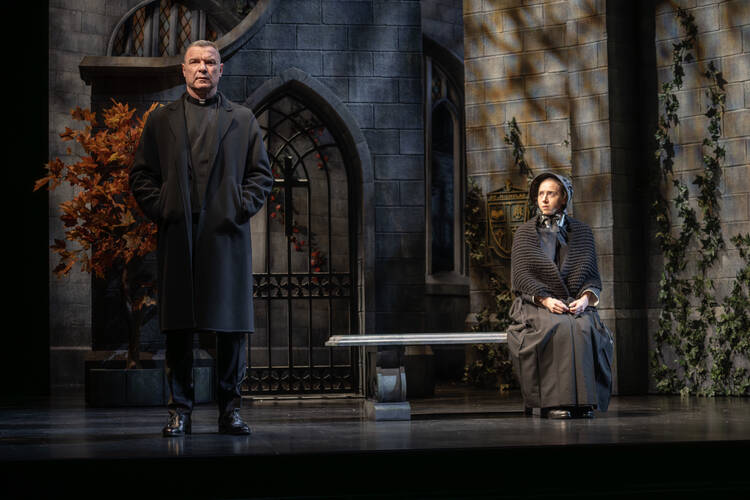It is only two decades old, but “Doubt,” John Patrick Shanley’s crackling play about a possible case of clerical abuse at a Bronx Catholic school in the early 1960s, already feels like it’s been with us forever. That is one definition of a classic: a song or play that becomes so ubiquitous that it seems to be inevitable, ever present, taken for granted.
But as with song standards, such familiarity often does new productions of a beloved play no favors; it is impossible to escape comparison with previous renditions. The new Broadway revival of “Doubt” is a case in point: It is an entirely credible staging in which the play’s stubborn, provocative indeterminacy comes through with clarity and precision. It is also, I am sorry to report, somewhat stale and perfunctory, moving through its paces dutifully but rotely.
It is only two decades old, but “Doubt” already feels like it’s been with us forever.
At first, this overly tidy approach feels in sync with the rigid, rule-based philosophy of Sister Aloysius (Amy Ryan), the principal of St. Nicholas Church School, as she upbraids a tremulous new recruit, Sister James (Zoe Kazan), about her overly sentimental and sympathetic approach to her students. That careful tread also makes a kind of sense as Aloysius begins to move against Father Flynn (Liev Schreiber), a charismatic priest she suspects of abusing a student. She knows all too well that she is not taking on just one man but is challenging a male hierarchy prone to dismiss her suspicions.
But “Doubt” is more than a simple clerical whodunit. It is also a battle of wills, and it works best when the arsenals feel more or less equally matched: when Sister Aloysius’s steely certainty is as compelling as Father Flynn’s informality and warmth, while Sister James’s anguished equivocation quivers between these opposite poles like a spark in a Tesla coil.
“Doubt” is more than a simple clerical whodunit. It is also a battle of wills.
The playing field was evenly stacked in the play’s original Broadway production, with Cherry Jones’s Aloysius fixing both Brian F. O’Byrne’s earnest Flynn and Heather Goldenhersh’s fluttery James under her wry but unflinching glower. I also appreciated the second Broadway cast’s variations on these themes: Eileen Atkins’s witheringly wintry Aloysius, Ron Eldard’s strapping Flynn, and above all Jena Malone’s revelatory James. The excellent 2008 film version mixed these ingredients a bit differently, but there was no mistaking the combustible chemistry among Meryl Streep, Philip Seymour Hoffman and Amy Adams in the same roles.
Amy Ryan, a first-rate actress best known for hardscrabble characters in “Gone Baby Gone” and “The Wire” (I also recall fondly her turn as a nerdy love interest on “The Office”), has no trouble establishing Sister Aloysius’s grit and skepticism. But Ryan never uncoils from a protective crouch, and in the crucial scenes in which her authority is challenged—first by Flynn, then by the mother of the student she suspects is Flynn’s victim, Mrs. Muller (Quincy Tyler Bernstine)—she looks over-matched and overwhelmed.
The performance that haunts Ryan’s, alas, is one we may never see. Tyne Daly was originally cast as Aloysius in this revival but bowed out due to illness, and it is hard not to imagine the combination of irrepressible brass and vinegar she might have brought to the role. Liev Schreiber’s ingratiating Flynn, in particular, needs a stronger counterweight than Ryan. He is not only physically imposing; he is also unavoidably likable and ostensibly reasonable. As Flynn espouses the more open and welcoming Vatican II church we know with hindsight will win out over Aloysius’s more astringent vision, we cannot help but side with him.
About this play’s enduring quality there can be no doubt.
That liberal impulse is true to Shanley’s vision, but so is a real investment in Aloysius’s illiberal vigilance. The playwright takes seriously the notion that it is dangerously foolish to play nice with the world’s real villains—that indeed there are real wolves against which the flock must be defended. This seems self-evident in the case of the church’s abuse scandals. Indeed, the most credible evidence of Flynn’s guilt in “Doubt” is not in the various clues he drops—all of them able to be explained away as innocent—but in Aloysius’s certainty itself, based on her prior experience of similar cases.
Of course, Shanley wants us also to interrogate this certainty, to see that it can do great harm in the name of purported justice. He wrote the play, after all, while the United States was justifying its invasion of Iraq with reference to Saddam Hussein’s alleged chemical weapons program. If “Doubt” feels at all dated or slightly off-key, it is in this insistence—after decades of revelations about clerical abuse, not to mention the #MeToo movement—that a presumption of innocence deserves equal consideration with well founded suspicions about how the world actually works. It is hard to feel the equivalence, in other words, between Bush-era crusades against a so-called “axis of evil” and a nun’s campaign against not only a single priest but an entire structure of complicity.
These remain live questions in a liberal society, though, and are eminently worthy of dramatization. “Doubt” is a great play not only for its crisp plotting, fine-grained characterization and judiciously employed flashes of humor; it is also a breathtaking balancing act that never feels like a simple argument among “sides” in a well-worn debate.
This essential ambivalence comes through even in less-than-stellar productions. The first time I saw “Doubt” was in a so-so pre-Broadway run in Pasadena in 2005, in which Linda Hunt played Sister Aloysius as a crusty pixie opposite an impossibly handsome actor, Jonathan Cake, as Father Flynn. That hardly felt like a fair fight. But while it can be hard to glimpse a good play through a mediocre production, it was apparent then, as it is with the disappointing current Broadway production, that about this play’s enduring quality there can be no doubt.








